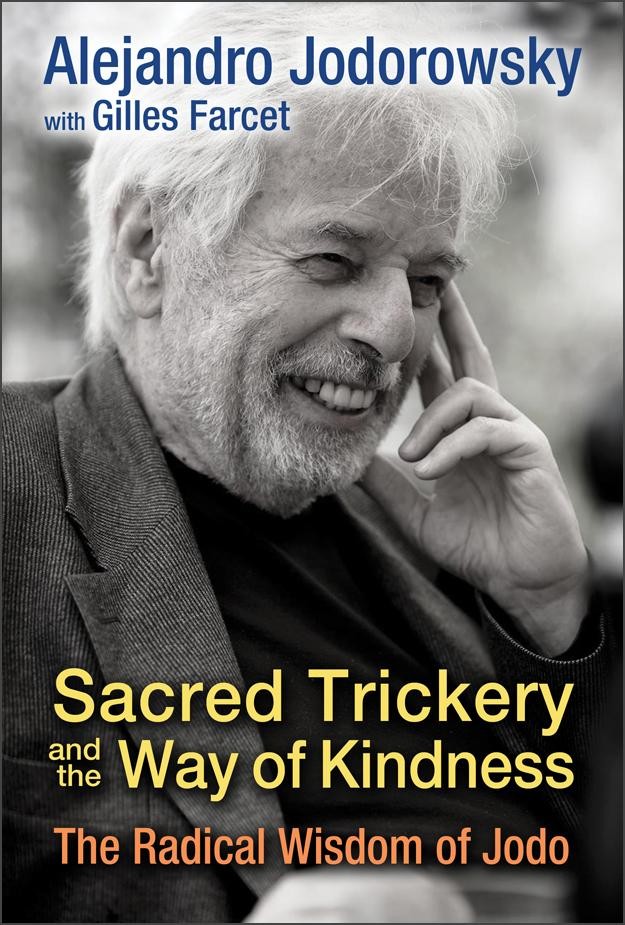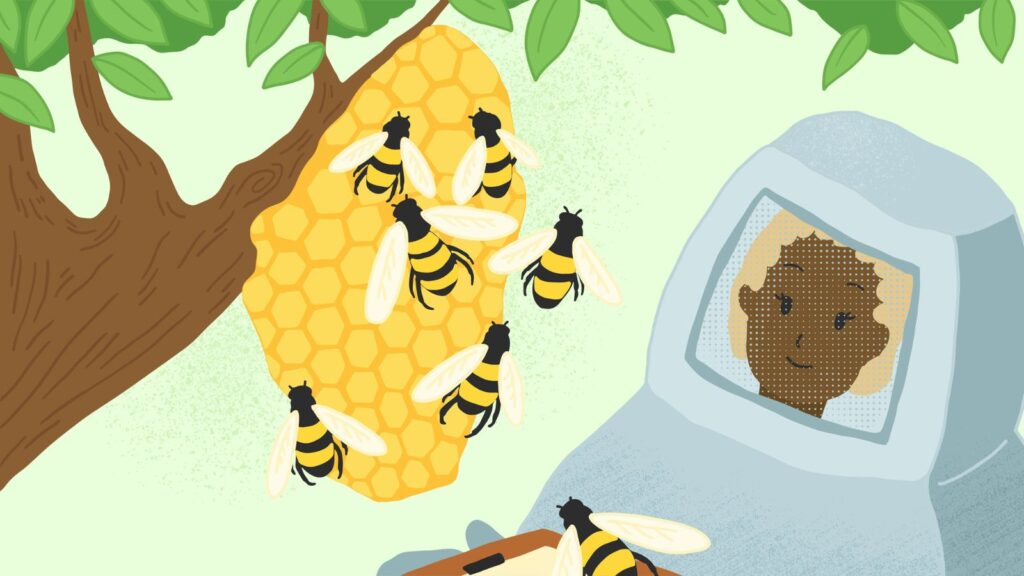The following is excerpted from Sacred Trickery and the Way of Kindness: The Radical Wisdom of Jodo by Alejandro Jodorowsky with Gilles Farcet, published by Inner Traditions.
In this excerpt from Gilles Farcet’s 1989 interview with Alejandro Jodorowsky, Jodorowsky discusses being spiritually “good” as a child, growing up with a militant atheist father, and how fear of dying drives his search for divinity.
Gilles Farcet: How is it that you, Alejandro, enjoy this privilege [of feeling one’s self to be good]?
Alejandro Jodorowsky: I have worked a great deal for it, you understand! I have done nothing else. . . . This work began practically with my birth. I am a good child of immigrants, born in northern Chile. . . . I was good, that is a fact; I had that quality, accompanied by a desire to achieve spiritual crystallization.
You experienced this very early on, from early childhood?
Yes, very early . . . I can see myself now at the age of six or seven, sitting before the door to my father’s shop, where he sold women’s underwear. I was eating a banana. A poor child ran by and snatched the fruit from my hand. I did not weep, but felt pity for this child. And the next day I sat out there again with a banana, waiting for him to steal it from me. So my driving force was goodness, right away. At the same time I have asked myself all the usual questions: Why must I die? Does God exist? When I was eighteen the awareness of my mortal nature struck me like a hammer on the head. I had never properly realized it before then. And I went running through the streets, crying out that I did not want to die! From this moment on I have needed to appease my dread.
Did you have a religious education?
Not at all, or rather, yes: I was raised with the religion of atheism. My father was a fanatical nonbeliever, opposed to any spiritual conception of existence. So that is where I started from. I had to fill this void and explore my being. So I disguised myself like a clown, pursued different trades as if each time I was putting on a new costume: I disguised myself as a puppeteer, a music-hall comedian, a theater and film director, a poet, a novelist, a bande-dessinée author, an artist, whatever!
Were you immediately drawn to the artistic dimension of existence?
Yes, to theater and literature. I went to university like any old idiot, but I was disgusted with it. Then my artistic life began, and my family life was added to it. My family has been like a school for me, a work of self-knowledge. And it took about half a century for me to feel truly good. Before that I was always searching, wandering through all the cultures, coming in contact with masters. . . . When I was forty I began to find myself, and at fifty it seemed to me that I had made some real gains.
Let’s talk a little more about your schooling. Your spiritual education went hand in hand with your artistic apprenticeship.
Yes, my first masters were five great Chilean poets who shaped my artistic spirit. I was lucky to be born in Chile. Before all the political catastrophes, it was a country of poets, a magical land, like an island. We were contained between the mountain range of the Andes and the Pacific Ocean, in a very surrealist atmosphere of collective madness. In the afternoon when work was over, the Chileans would get drunk, and life became a party. We bathed in a climate of chaos and total euphoria.
At what age did you leave Chile?
I was twenty-three.
What did you do there up until your departure?
First I was devoted to writing, and I endeavored to meet poets who have refined my artistic spirit. With them I learned to return to my own beauty, which is in fact what we all carry within ourselves. Then, in the university environment, I played at being a circus clown. It is hard to convey the ambience of that time there: the philosophy professors didn’t hesitate to disguise themselves as clowns, too, rolling around on the ground in front of their students. . . . The sexual revolution took place in Chile long before it spread over the rest of the world. . . . It was a permanent party. Then, after quitting the university, I gave my life over to puppets. I founded my own theater, which was combined with a twenty-four-person university choir. The government loaned us a warship in which we went all around the north of Chile. We toured the mining companies: the choir sang; then I put on my show for the workers and the children.
What were the themes of the shows?
I was inspired by the writings of García Lorca, or else I made up stories that were already very symbolic. I remember one story about a woman who fell in love with a man whose head was a mirror: in other words she fell in love with her own reflection! I also imagined staging a minotaur-Christ, with Socrates and Plato clowns as the choir.
Did you continue to be a puppeteer until you were twenty-three?
No, because after three years devoted to puppets, I discovered the importance of human actors. I realized that the quality of an actor has less to do with what he says than with the sentiment he conveys. So I started doing mute theater, pantomime, and started a troupe, which, by the way, still exists today. I became fairly famous in Chile at the time, leading that company of forty people. We traveled the country . . . I played this role until a decisive crisis took place in me. At a certain moment I saw that I had explored all the possibilities that were offered to me in this country and that in order to advance, I must leave. I had reached a plateau and could no longer learn very much.
You were very young when you achieved what many people strive for all their lives: you began living well off your art; you secured your place.
Yes, I was well known, as I said. I had practically made my own life. I was engaged; it remained only for me to be married, to have children, and to play off my reputation. But this seemed like a dead end to me. One day I suddenly announced to my company that I was departing, leaving everything to them: I owned a big studio, scenery, costumes. I abandoned all these possessions, to the great horror of most of them. I threw my address book into the sea, destroyed all my photos. . . . This is why, today, I do not have any picture of myself as a child or adolescent. I wanted nothing to remain. I never saw my father, my mother, or my friends again. . . . In fact, it is only recently that I rediscovered my father, who is eighty-eight years old. At the time I cut all ties and left without looking back.
Your story makes me think of the sannyasins, those Hindu renunciates who burned their identity papers and clothes, severed all family ties, and gave themselves over to wandering.
Yes, this was truly a way of ending life in order to be reborn.
This goes far beyond the feeling of professional stagnation; you went through a sort of “death to yourself” of a mystical order.
Exactly. I was driven to distraction by not finding divinity, by not discovering cosmic love in myself.
You knew that this divinity existed?
I wanted it to exist! On the one hand I did not believe in it, because of my upbringing. I thought that I would never arrive at faith. On the other hand I hoped desperately to encounter the divine. I lived in constant fear of death, all my being was revolted at the prospect of my demise. I searched for an answer but did not find it. I should mention that during that epoch, at the beginning of the 1950s, I knew nothing at all of oriental mysticism, of Zen.
Did you know that the Hindu mystic Ramana Maharshi achieved enlightenment after feeling terrible fear while thinking of death?
Ah, yes! I remember my first great attack of fear of death, after a marvelous night of partying in Chile. I must have been nineteen years old. Our house had burned; only my room had been spared! So my friends and I had a huge party there, a celebration of burning. I wore a coat of flames, disguised as fire. Around three or four in the morning, everyone was drunk, and we ended up at the market, eating cheese. I was swimming in happiness. And all at once I realized that all my friends would die, that the whole city would die, that the Earth would die, that the stars would die . . . that nothing would be spared, least of all me. It was a sort of negative enlightenment. Suddenly sober I saw how the city was bathed in anguish, how the people around me were prey to this fear, unable to face it. From that day on I had to come into contact with divinity in order to appease my terror.
You did not yet know about Zen or Hinduism; weren’t you tempted by Catholicism?
No, my father had influenced me too much. He was a Jew who renounced everything. I had watched him throw crosses, stars of David, and statuettes of the Virgin down the toilet, repeating in an obsessive manner: “This does not exist, this does not exist. . . .” He spat in front of synagogues and insulted the priests he met on the street. He told me over and over: “After death there is nothing, you rot, that is all.” In short I had never been prepared to accept a religious vision of things. That said—my friends and I, being poets—played around a good deal with the Bible and the Gospels. We grasped them above all through Dostoevsky’s Idiot, and so this was more of a literary game. I had also been surprised by the case of a young man who, after working intensely on puppets with me for fifteen days, decided to become a Benedictine monk. I had been rather harsh with him because I found him stupid, and now, suddenly, he was announcing to me that he was going into a monastery and thanking me for what I’d done for him! I protested: “I’ve found nothing in my life, and you’re thanking me!” He answered: “You’ll understand one day.” This was my only direct contact with a true Christian.
















